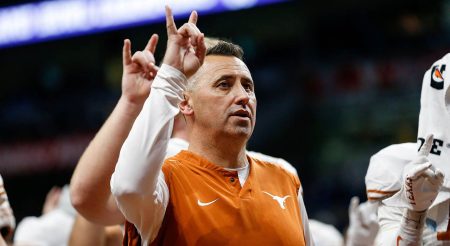Saquon Barkley’s pursuit of the NFL single-season rushing record ended abruptly in Week 18 when Philadelphia Eagles head coach Nick Sirianni decided to rest him for the playoff push. Barkley, who finished the season with 2,005 rushing yards, fell just 100 yards short of Eric Dickerson’s 1984 record of 2,105 yards. The decision sparked a wave of emotions for Barkley, ranging from initial indifference to a burning desire to etch his name in football history.
Barkley revealed his internal conflict in a candid discussion with reporters. Initially, when Sirianni approached him about sitting out the final game against the New York Giants, Barkley expressed apathy towards the record. However, after reflecting on the opportunity, the magnitude of achieving such a feat began to sink in. He realized the chance to become a part of NFL lore might never present itself again. This realization sparked a change of heart, turning Barkley’s initial indifference into a yearning for the record.
Adding another layer to his internal struggle was the reaction of his family. Barkley confided that his loved ones were even more eager for him to break the record than he was. Their enthusiasm further fueled his desire, creating a complex emotional landscape as he wrestled with the decision. Despite his personal and familial aspirations, Barkley ultimately accepted Sirianni’s decision, prioritizing the team’s playoff goals over individual accolades. He acknowledged the significance of a deep playoff run, recognizing that team success ultimately trumps individual achievements.
The decision to rest Barkley highlights the delicate balance between personal milestones and team objectives in professional sports. While Barkley’s pursuit of the record captured the attention of fans and media alike, the Eagles’ coaching staff prioritized the long-term goal of a Super Bowl championship. Preserving Barkley’s health for the playoffs was deemed more crucial than the potential for an individual record. This decision underscores the pragmatic approach often adopted in professional sports, where the collective good of the team often outweighs individual aspirations.
Eric Dickerson’s record, which has stood for nearly four decades, remains a testament to his exceptional talent and the historical context of the era. In 1984, Dickerson surpassed O.J. Simpson’s 1973 record of 2,003 yards, carrying the ball a staggering 379 times. Barkley, in comparison, accumulated his 2,005 yards on 345 carries, showcasing his efficiency and explosiveness. While Dickerson’s record remains intact, Barkley’s performance serves as a reminder of the evolving nature of the running back position and the continued pursuit of excellence in the NFL.
Barkley’s three-year, $37.75 million contract with the Eagles, which includes $26 million guaranteed, solidifies his position as the highest-paid running back in franchise history. This lucrative deal reflects his value to the team and underscores the Eagles’ commitment to building a championship-caliber roster. As Barkley turns his attention to the playoffs, his focus shifts from individual accolades to the pursuit of a Super Bowl title. The record, while tantalizingly close, fades into the background as the team’s collective ambition takes center stage. Barkley’s journey epitomizes the sacrifices and decisions that shape the landscape of professional sports, where individual aspirations often intersect with the overarching pursuit of team success.










